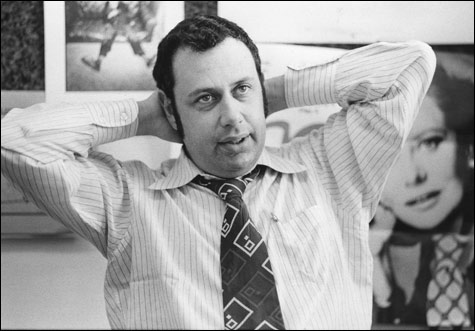Alan Lupo was many things — among them, the best metro columnist Boston may ever see
By MARGARET DORIS | October 9, 2008

STUFF RIGHT: In addition to his print work, Loops was a valued member of WBZ’s I-Team in the late 1970s. |
He originally set out to be a jazz critic. Alan Lupo, who died September 29 at a “very young” 70, loved jazz. Swing jazz in particular, and especially Artie Shaw, the child of immigrants, the poor Jewish kid from New Haven, the product of a broken home, who managed to become both a failed writer and a brilliant jazz clarinetist.
Lupo — or as he was known in these parts, Loops — was a more than adequate musician himself. But he wasn’t much for reading music. Mostly he played by ear, from the heart. So when he first showed up at UMass-Amherst marching-band practice back in the mid 1950s, an enthusiastic Lupo fell right in step — or so he thought — with his band mates belting out The Washington Post March. As the score’s last triumphal notes faded into the ether, one lone clarinetist kept going. And going.
They all — the trombones and the tubas, the flutes and French horns — turned around and looked at him. Finally, someone clued him in: “You cut those notes in half.” Make the count twice as fast as written. Cut time.
Lupo survived, to become a devoted member of not only the marching band but the concert band. His other ambition did not fare as well. By the time he hit the Columbia School of Journalism, in 1959, Lupo had morphed from a fledgling music critic to a faithful interpreter of the lives most often overlooked.
“He could hear the music of peoples’ voices, the music of urban speech, and he could replicate it perfectly,” remembers his wife of nearly 50 years, writer and BU journalism professor Caryl Rivers. Lupo and Rivers met at Columbia and, in a profession studded with nearly as many broken marriages as empty bottles, they became one of journalism’s great love stories. A Jewish guy from working-class Winthrop and a Catholic girl from middle-class Silver Springs, Maryland — a recipe for sitcom disaster, except, “He thought I was perfect,” explains Rivers. “And I thought he was.” They raised two kids, Steve, now an FBI agent, and Alyssa, an actor, and doted on three grandchildren.
 Related
Related:
He's number three, Murdoch mishegoss, Fourth-estate follies, 2009 edition, More 
- He's number three
The conditions seem perfect for Kevin McCrea's latest YouTube video : warm for February, reasonably sunny, no sonic competition from nearby construction.
- Murdoch mishegoss
Never mind that Rupert Murdoch is shelling out better than $2 billion to buy Metromedia’s seven TV stations. Never mind that he’s then turning around and reselling Boston’s WCVB-TV, Channel 5 to the Hearst Corporation for an astounding $450 million.
- Fourth-estate follies, 2009 edition
Between the rise of the Web, the ADD-addling of America, the fragmentation of any national political consensus, and the devastated economy, working in the press can feel a bit like manning the Titanic — and this year, the entire industry seemed to teeter on the edge of oblivion.
- Media Moses
Bruce Wall is blessed with a talent for publicity.
- Bad sports
When historians trace the rise of the blog as the dominant journalistic form of the 21st century, they’ll pay close attention to two recent developments.
- Head case
Who is Jim Marzilli, exactly? Is he a predatory letch? Or is he a deeply troubled man who needs to be kept from harassing women — but also from hurting himself?
- Blowing up
Everyone’s got the bad-economy blues these days — but the mood among peddlers of the printed word is especially bleak.
- Strange bedfellows
Wait, lemme get this straight: Was that Howie Carr — who's known for accompanying on-air references to homosexuality with a crude audio approximation of gay sex — happily schmoozing with guest Randy Price this past week?
- The Globe's Plight
If history is just one damn thing after another, then we are living in undeniably historic times.
- Will the Globe survive?
What would Boston's media landscape look like without the Boston Globe ?
- The Times Co.'s super-potent silent treatment
In an earnings conference call last week, Janet Robinson, the president and CEO of the New York Times Co., had choice words — make that one choice word — for published reports on the Times Co.'s attempts to unload the Boston Globe.
- Less

 Topics
Topics:
News Features
, Boston, Media, Tom Menino, More  , Boston, Media, Tom Menino, Federal Bureau of Investigation, Newspapers, Boston Globe, Boston Herald, University of Massachusetts Amherst, Artie Shaw, Lawrence Eagle-Tribune, Less
, Boston, Media, Tom Menino, Federal Bureau of Investigation, Newspapers, Boston Globe, Boston Herald, University of Massachusetts Amherst, Artie Shaw, Lawrence Eagle-Tribune, Less 